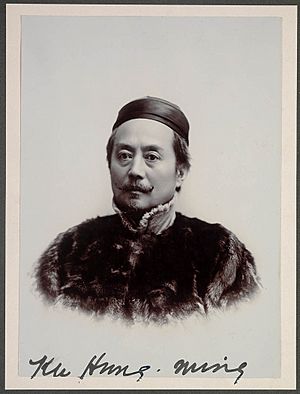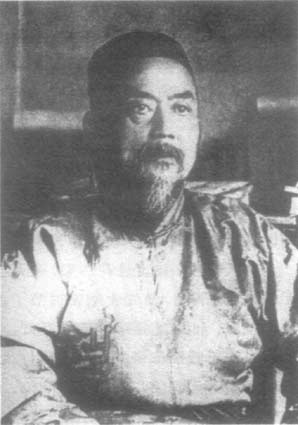Gu Hongming facts for kids
Quick facts for kids
Gu Hongming
|
|
|---|---|
 |
|
| Born | July 18, 1857 Penang,
|
| Died | April 30, 1928 (aged 70) |
| Other names | Tomson |
| Alma mater | University of Edinburgh, University of Leipzig, University of Paris |
| Occupation | Scholar, Professor |
Gu Hongming, also known as Ku Hung-ming, was a famous Chinese scholar and writer. He was born in British Malaya (which is now part of Malaysia). He was known for his strong belief in traditional Chinese culture and his unique personality. Gu Hongming lived from July 18, 1857, to April 30, 1928. He sometimes used the pen name "Amoy Ku."
Contents
Gu Hongming's Early Life and Education
Gu Hongming was born in Penang, which was then part of British Malaya. His father was a Chinese manager of a rubber plantation. His mother was Portuguese. When Gu was ten years old, the British owner of the plantation liked him very much. This owner took Gu to Scotland so he could get a good education.
Studying in Europe
In Scotland, Gu Hongming was known as Koh Hong Beng. In 1873, he started studying Literature at the University of Edinburgh. He earned his master's degree in 1877. After that, he studied Civil Engineering at the University of Leipzig in Germany. He also studied law in Paris, France.
Gu Hongming's Career in China
Gu Hongming returned to Penang in 1880. He worked for the government in colonial Singapore until 1883. In 1885, he moved to China. There, he became an important advisor to a high-ranking official named Zhang Zhidong. He worked with Zhang Zhidong for twenty years.
Important Roles and Beliefs
Gu Hongming became friends with the famous Russian writer Leo Tolstoy. Both Gu and Tolstoy did not agree with the Hundred Days' Reform. This was a movement led by thinkers like Kang Youwei who wanted to change China quickly.
From 1905 to 1908, Gu Hongming was in charge of the Huangpu River Authority in Shanghai. This group managed the river. He then worked for the Imperial Foreign Ministry from 1908 to 1910. After that, he became the president of Nanyang Public School. This school later became Shanghai Jiao Tong University.
In 1911, he left his job at the school. He did this to show his loyalty to the old imperial Qing government, which had just been overthrown. In 1915, he became a professor at Peking University.
Later Years and Influence
From 1924, Gu Hongming lived in Japan and Taiwan for three years. He was a guest lecturer, teaching about Asian cultures. He then returned to Beijing and lived there until he passed away on April 30, 1928. He was 72 years old.
Gu Hongming strongly supported the idea of a monarchy (having an emperor or king). He also believed in traditional Confucian values. He even kept his long braided ponytail, called a queue, after the Qing dynasty ended. This made him a very interesting person to many.
Many stories and famous sayings are linked to him. Famous writers like Ryūnosuke Akutagawa, Somerset Maugham, and Rabindranath Tagore visited him when they were in China.
Gu Hongming was very good at languages. He could speak English, Chinese, German, Russian, and French fluently. He also understood Italian, Ancient Greek, Latin, Japanese, and Malay. He learned Chinese after his studies in Europe. Even though his Chinese handwriting was not the best, he was very skilled with the language. He wrote several books in Chinese. One of them was a detailed story about his time working for Zhang Zhidong.
His character also appeared in a TV drama called "Towards the Republic."
Gu Hongming's Written Works
Gu Hongming wrote many books in English. Some of his well-known English works include:
- Papers from a Viceroy's Yamen: a Chinese Plea for the Cause of Good Government and True Civilization (1901)
- Et nunc, reges, intelligite! The Moral Causes of the Russo-Japanese War (1906)
- The Universal Order or The Conduct of Life (1906)
- The Story of a Chinese Oxford Movement (1910)
- The Spirit of the Chinese People (1915)
He also translated important Confucian classic texts into English. These include:
- The Discourses and Sayings of Confucius (1898)
- The Universal Order or Conduct of Life (1912)
- Higher Education (1915)
Gu Hongming even translated a famous English poem, The Diverting History of John Gilpin by William Cowper, into classical Chinese verse.


